When you look up at night, have you ever thought about what the stars have planned for you? Or you've used an astrology app to guide you through life's big decisions, like money, love, career, or personal development.
If so, you may already know about Co-Star, a well-known astrology app that gives you daily reports and highly personalized astrological advice.
You may be wondering, "Why not build my own astrology app?" after seeing how well Co-Star did. It is a wonderful thought.
With a sizable, active community seeking spiritual advice and personal insights, the field of astrology is vast and continues to expand. To develop an astrology app like Co-Star, we'll walk you through the crucial steps.
We'll talk about everything, from coming up with ideas and designing the astrology app to putting it together technically and coming up with ways to sell it.
Let's go on this trip through the stars and find out what goes into how to create an astrology app like Co-Star that people like.
Introduction to the Co-Star App
Co-star is widely considered the best astrology app in the US. The app was launched in 2017 and gained traction due to its trendy style interface and detailed astrological insights.
It differentiates itself from other applications by using cutting-edge technology like AI, ML, AR, and data provided by NASA to create highly tailored horoscopes based on your birth chart.
Co-star gives you detailed compatibility readings that highlight your strengths and weaknesses, along with daily updates.
Many have been drawn to it by its straightforward insights and sturdy interface. Out of the app's over 20 million downloads, women in the US between the ages of 18 and 25 have downloaded 25% of the total.
You can communicate with friends who are interested in astrology using Co-star and even compare zodiac signs with them.
With such a huge user base and cutting-edge tech, it's no wonder that investors are coming to Co-star, seeing its promise in the growing astrology market.
And if you’re still thinking about what makes it such a hot pick, check out the next part for more reasons!
Why Invest in Developing an App Like Co-Star?
Astrology has been part of human culture for ages, and with smart tech, it’s more available than ever. Apps like Co-Star have turned astrology into a customizable, daily tool that helps users manage life.
The demand for astrology apps is growing, with millions seeking daily horoscopes and insights. Creating an app like Co-Star taps into this involved audience, giving horoscopes, in-depth observations, and social features.
This plan has built a loyal user group, making it successful. By investing in an astrology app, you cater to astrology fans wanting customizing and ease, with room to innovate and stay ahead of rivals.
Here are some market stats that show why you should spend on making an astrology app like Co-Star:
-
- The global astrology app market is projected to reach $113 million by 2031, growing at a CAGR of 24.93%.
- In 2022, 27% of American adults consulted astrologers, and six out of ten Americans believe in astrology or similar practices.
- Global sales of astrology and horoscope apps reached nearly $2 billion in 2021, with the market expected to grow to $20 billion by 2031.
- The rise of astrology apps has surged post-COVID-19, driven by increased demand for personalized spiritual guidance.
How Do Apps Like Co-Star Work?
Apps like Co-Star offer a personalized astrology experience, using detailed user data and advanced algorithms to generate horoscopes and astrological insights. Here’s how they work:
1. Personalized User Profile
-
- When you sign up for Co-Star, the app saves your birth information, including the exact time, date, and place of birth.
- This information is used to build your unique astrological picture, or natal chart, based on the location of heavenly bodies at the time of your birth.
2. Astrological Analysis
-
- Co-Star uses data from NASA and an advanced program to study the positions of stars, planets, and other celestial things.
- The app analyzes this data using astrology principles to create your daily, weekly, and monthly horoscopes, giving you predictions and insights suited to your birth chart.
3. Personalized Horoscopes
-
- The app offers individual horoscopes based on your zodiac sign and the unique features of your birth chart. It looks at things like the sun, moon, and rising signs to provide a better understanding of your astrological picture.
4. Real-Time Astrological Insights
-
- Co-Star offers real-time updates about heavenly moves and their effect on your life, advising on different areas such as love, work, and personal growth.
- Notifications keep you updated about changes in the cosmic world, ensuring that your horoscopes are always relevant to your present situation.
5. Social Interaction
-
- One of the main features of Co-Star is its social component. You can connect with friends and family through the app, compare your birth charts, and share thoughts.
- This function improves the fun and engaging nature of the app, making astrology a social experience.
6. Daily Notifications
-
- Co-Star sends push messages to keep users involved, telling them to check their daily horoscopes or offering updates based on cosmic moves that could impact them.
7. Data Security
-
- The app ensures that your personal birth information and data are safely kept and protected, keeping privacy for all users.
How Co-Star Is Different From Other Astrology Apps?
Co-Star stands out from other astrology apps by giving customized, AI-driven observations mixed with a unique social networking component.
Unlike traditional astrology apps that simply provide general daily horoscopes, Co-Star uses real-time data, including your birth chart, to offer more accurate, personalized readings.
Its design focuses on user interaction, not only giving astrological insights but also allowing users to share and connect with their friends about their astrological journeys.
Here’s a review of Co-Star with other famous astrology apps:
|
Feature |
Co-Star |
Other Astrology Apps |
|
Personalized Horoscopes |
Yes, based on the birth chart |
Mostly generic or birth chart-based |
|
AI Integration |
Advanced AI-driven insights |
Often, static or simple algorithms |
|
Real-Time Updates |
Yes, daily updates |
Limited or no real-time updates |
|
Social Networking Features |
Social sharing, community features |
Usually lacks social features |
|
Design & UI |
Modern, sleek, minimalist |
Varies, often less visually appealing |
|
Compatibility Reports |
Yes, detailed relationship analysis |
Basic compatibility reports |
|
Push Notifications |
Yes, daily personalized readings |
Often, basic or no notifications |
|
Free Features |
Limited free access, paid-for premium features |
Mostly free with basic features |
Co-Star sets itself apart by combining AI technology, personalized daily readings, and strong community features, making it not just an astrology app but a social platform for astrology enthusiasts.
If you're wondering how to develop an astrology app like Co-Star, you'll need to integrate advanced tech, user-friendly design, and interactive features to keep users engaged.
Essential Features to Include in Co-Star Clone App Development
If you want to build an astrology app like Co-Star that stands out, it’s crucial to add some key features that meet your users' spiritual needs and keep them coming back for more.
Here’s a look at the important qualities that can make your astrology app a big hit, just like Co-Star:
1] AI-Generated Horoscopes & Real-Time Insights
Offering AI-powered daily views ensures the app stays current and useful to users. By giving real-time updates, users will stay interested and keep coming back for custom predictions.
Real-time insights based on their birth chart analysis add a dynamic touch, matching their changing astrology needs.
2] Natal Chart Analysis & Compatibility Reports
Birth chart analysis helps people get a better grasp of their personality characteristics, strengths, and shortcomings.
Compatibility reports, based on astrological data, assist users in evaluating their relationships, making the app more dynamic and enlightening.
This tailored approach keeps users engaged with the app and pushes them to discover their astrological characteristics.
3] Daily Personalized Readings & Push Notifications
Providing daily personalized readings ensures users stay linked with the app. By sending push messages suited to their astrology charts, users receive quick, relevant information, fostering daily involvement.
If you want to build an astrology app like Co-Star, focusing on personalized readings based on specific astrology signs can significantly improve user retention and happiness.
4] Social Networking and Community Features
Social networking tools allow users to connect, share their horoscopes, and talk about their readings, adding a sense of community to the app.
A social component like this not only boosts app usage but also helps create a loyal, interested user base.
Users can share thoughts, compare charts, and connect with others, making astrology more fun and social.
5] Intuitive UI/UX for Better Engagement
A clean and user-friendly design is crucial for keeping people interested. A simple UI/UX design ensures smooth movement and usability.
Features like easy-to-read maps, clear horoscope patterns, and an aesthetically nice design make the app enjoyable to use.
A well-designed app improves user experience, raising total app happiness and engagement.
6] AI-powered chatbots for Astrology Guidance
Astrology advice can be given right away by an AI-powered chatbot that can answer questions about users' zodiac signs, daily horoscopes, and compatibility.
This feature makes sure that users are engaged at all times and improves their experience by giving them quick, personalized information.
7] Tarot & Oracle Card Readings
A lot of people who are interested in astrology also read tarot cards and oracles.
Adding a feature that lets users draw daily or unique tarot or oracle cards gives the app a more magical feel, which keeps users interested and helps them stick with it.
8] Live Astrology Consultations
Adding live chat or video calls with professional astrologers to your app makes it look more high-end.
People can get custom tarot card readings, astrology readings, or relationship help in real-time, which makes the app more trustworthy and fun to use.
9] Moon Phases & Planetary Transits Alerts
Astrology supporters often watch star moves and moon phases. Suppose you want to make an astrology app like Co-Star, offering real-time updates on retrogrades, full moons, eclipses, and solar transits.
In that case, it helps users stay connected with cosmic events, making your app a valuable tool for astrology followers.
10] Personalized Astrology Reports & PDF Downloads
Allow users to create thorough horoscope reports based on their birth charts, life path numbers, or match analysis.
Giving them the choice to download these reports as PDFs adds value and makes the app a go-to resource for greater astrology insights.
How to Create an App Like Co-Star?
Building an app like Co-Star includes a thorough, step-by-step app development process, where each part plays a crucial role in shaping the app’s success.
By fully understanding each stage, you can effectively plan your project, making it faster and more efficient. Ready to explore the journey?
Let’s get started!
Step 1: Conduct Market Research
Before getting into the development of your astrology app like Co-Star, it’s important to understand the market environment. You need to:
-
- Study popular astrology apps like Co-Star, The Pattern, and AstroStyle to find what features resonate with users and what gaps you can fill.
- Understand your target audience, whether they are astrology fans, regular users, or those wanting personalized spiritual advice.
- Gather details about user preferences, the type of astrology material they enjoy, and how they interact with these apps.
By getting this data, you’ll be in a better position to create an app that meets your users’ wants and stands out in a competitive market.
Step 2: Selecting the Right Features
Choosing the right features is essential to your astrology app’s success. The features you pick will not only describe the user experience but also ensure the app’s long-term survival.
Start with important features like AI-generated horoscopes, natal chart analysis, match reports, and personalized daily readings to offer value from day one.
However, to truly stand out, combine advanced features like real-time information, push alerts, and social networking functions that promote engagement and keep users coming back.
Think about adding personalized insights, community features, and adjustable alerts to keep interaction high. Once your feature set is strong and well thought-out, you can move on to creating a simple and interesting app.
Step 3: Focus on UI/UX Design
UI/UX design plays a key part in creating an interesting, user-friendly experience. With the wealth of astrology apps available, if your app lacks visual appeal or is difficult to browse, users will quickly move to your rivals.
To make your Co-Star clone app shine, focus on creating a clean, simple layout that improves user involvement. Prioritize ease of navigation with dynamic charts, easy-to-read horoscopes, and visually appealing layouts.
Incorporate personalized readings and careful design elements that make the app enjoyable to use, ensuring users are engaged in a smooth, visually pleasing experience. The right design can set your app apart and keep people going back for more.
Step 4: Develop Your App
Now that your design is ready, it’s time to start making your astrology app like Co-Star. When it comes to iOS app development and Android app development, you have the option to choose between native apps for iOS and Android or a cross-platform method using tools like Flutter or React Native.
Cross-platform development saves both time and resources while providing a smooth user experience across all devices.
If you're wondering how to develop an app like Co-Star, here’s a rundown of the technology needs
4.1 Frontend (What people see and engage with)
The front end is where the magic happens. The app interface can be made using Swift for iOS, Kotlin for Android, or a cross-platform tool like Flutter or React Native.
The user design should be simple, giving easy access to daily readings, personalized horoscopes, and other features.
Make sure the navigation is easy, and the material is visually interesting to keep a nice user experience.
4.2 Backend (The unseen engine)
The backend is the heart of your app, handling all the reasoning and processes. To handle real-time changes, bookings, messages, and user info, you’ll need a powerful backend system like Node.js, Django, or Ruby on Rails.
Additionally, a reliable database such as PostgreSQL, MongoDB, or Firebase is important for keeping horoscopes, user accounts, and astrology insights safe.
With the right tech stack in place, your app will be ready for smooth performance and growth, ensuring a great experience for your users.
Step 5: Testing of the App
Once development is complete, it’s time to ensure your astrology app is perfect with thorough testing. This stage is crucial for ironing out any bugs, mistakes, or problems that could affect user experience.
Begin with functional testing to ensure all features, like horoscopes, daily readings, and match reports, are working as intended. Next, conduct speed tests to ensure that the app works well under different situations, such as high traffic or various device types.
Don't forget security testing to protect user info and ensure safe transfers. Test across various devices and platforms to guarantee smooth operation. Once everything is fine-tuned and works easily, your astrology app is ready for release.
Step 6: Launching the App
Once your astrology app is fully tested and ready to go, it’s time to start! Submit your app to both the App Store and Google Play for review. The approval process usually takes anywhere from a few days to several weeks, based on the platforms.
While waiting for approval, it's crucial to start planning marketing strategies that will boost app exposure and sales. Engage with social media stars, create focused ads, and offer friend deals to incentivize early users.
Additionally, consider leveraging platforms like Instagram and TikTok, where astrology material has a strong following. Get ready for a great start and watch your user base grow!
Step 7: Post-Launch Maintenance
After your astrology app goes live, the work doesn’t end. Post-launch maintenance is important for keeping your app running easily and free of bugs. Monitor the app’s speed, fix any new problems, and conduct regular changes to improve usefulness.
Introduce new features, like more detailed compatibility reports or advanced AI-generated insights, to keep users involved. Continuously improve the app based on user comments to stay current and ahead of the competition.
Consistent changes and listening to user needs will help you maintain a loyal user group and keep your app at the top of the market
Now that you have a clear idea of how to create an app like Co-Star, it's time to turn our attention to the cost factor.
Understanding the cost involved is crucial for planning your project effectively and ensuring your app’s success. The development cost relies on various factors, such as features, platform choice, design difficulty, and development time.
Let’s review the key cost components to give you a better idea of what to expect when making your astrology app.
Cost to Make an App Like Co-Star
The cost to develop an astrology app like Co-Star varies based on factors such as features, design complexity, AI integration, and the development team. On average, the cost to build such an app can range from $20,000 to $150,000 or more, depending on the scope of the project.
Here’s a breakdown of the expenses:
|
Cost Factor |
Low Range Estimate |
High Range Estimate |
|
Development Team Location |
$20/hour (Asia) |
$200/hour (U.S./Europe) |
|
Basic Features |
$5,000 |
$25,000 |
|
Advanced Features |
$10,000 |
$50,000 |
|
UI/UX Design |
$3,000 |
$10,000 |
|
Cross-Platform Development |
$10,000 |
$30,000 |
|
Third-Party Integrations |
$3,000 |
$15,000 |
|
Maintenance (Annual) |
$5,000 |
$15,000 |
Additionally, there are secret costs such as server upkeep, app changes, and possible unknown challenges in development that could add to the total cost.
These ongoing costs should be accounted for in your long-term budget plan to ensure the app’s continued usefulness and user involvement.
Proper spending and planning for these costs will ensure your app stays competitive in the growing astrology app market.
Factors Affecting the Cost of Co-Star Like App Development
Building an astrology app like Co-Star requires careful planning and investment, as multiple factors affect the total development cost.
From core features to advanced AI powers, each element plays a crucial role in setting the end budget. Here’s a breakdown of the key factors that will impact your development expenses:
► App Complexity & Features
The more advanced features you add, the higher the development cost. Basic features like daily horoscopes and match readings are important, but adding AI-driven insights, real-time updates, and social networking features will raise costs.
► UI/UX Design
A clean and appealing design is important for keeping people hooked. Elements like custom graphics, smooth scrolling, and interactive astrology charts improve user experience but require skilled designers, increasing development costs.
Investing in high-quality UI/UX ensures your app stands out in a competitive market and keeps users coming back.
► Platform Selection
Developing different apps for iOS and Android can enhance the mobile app development cost compared to a cross-platform method.
While native development offers better speed, smooth user experience, and customized features for each device, it requires extra time, resources, and knowledge.
Choosing between native and cross-platform development relies on your budget and efficiency goals.
► AI & Machine Learning Integration
Astrology apps like Co-Star harness AI-driven forecasts and personalized insights, needing complex algorithms, machine learning models, and extensive data processing.
Implementing AI for accurate forecast generation, relationship analysis, and real-time astrology changes adds to the complexity and cost of development.
The more advanced the AI in astrology apps, the higher the cost needed for development and efficiency.
► Development Team Location
The cost of hiring mobile app developers changes based on area. Developers in the U.S. or Europe usually charge between $100 to $200 per hour, greatly raising the total development cost.
In comparison, shifting to regions like Asia can lower costs, with hourly rates running from $20 to $50. Choosing the right development team relies on your finances, desired skills, and project difficulty.
► Third-Party API Integrations
Integrating third-party services like astrology APIs for accurate forecasts, payment methods for accounts, and cloud storage for user data improves usefulness but also adds to development costs.
These services often come with usage-based prices, meaning better user involvement can lead to increased running costs. Choosing cost-effective and scalable options is important for matching efficiency and budget.
► App Maintenance & Updates
After the app launch, continual funding is important to keep the app speed and user involvement. Regular changes, bug fixes, and the introduction of new features ensure that your astrology app stays current and meets users’ changing needs.
This ongoing effort not only improves user happiness but also helps keep your app competitive in the market. Additionally, spending on post-launch upkeep is important to fix problems, improve speed, and add features based on user feedback, thereby driving long-term success.
How to Monetize an Astrology App Like Co-Star?
Monetizing an astrology app like Co-Star can be done through several methods to create income while keeping user involvement. Here are some of the most effective ways:
1. Freemium Model
-
- Basic Features Free, Premium Features Paid: Offer core astrology services like daily horoscopes, birth chart analysis, and daily insights for free. To unlock advanced features, such as in-depth compatibility reports or exclusive AI-driven forecasts, users can pay for a paid version.
2. Subscription Plans
-
- Monthly or Annual Subscriptions: Offer users a fee for ongoing access to special features. Subscription plans can be scaled, giving different levels of entry at varying price points.
3. In-App Purchases
-
- One-Time Purchases: Allow users to buy personalized reports, exclusive horoscopes, or thorough match studies.
- Gemstones & Zodiac Items: Include virtual goods related to astrology (like gemstones, tarot cards, or exclusive stickers) that users can buy for customization.
4. Ads
-
- Display Ads: Integrate non-intrusive ads like banner ads or video ads to generate revenue without affecting the user experience.
- Rewarded Ads: Allow users to watch ads in exchange for additional features or insights, keeping the experience engaging and non-disruptive.
5. Affiliate Marketing
-
- Astrology-Related goods: Partner with astrology or spiritual product sellers to promote their goods straight within the app. You can earn partner fees on orders made through your app.
- Books, Crystals, and Workshops: Promote astrology-related books, classes, or gem collections with affiliate links.
6. Selling User Data (Anonymously)
-
- Insights for Research: Gather anonymized user data and sell it to academics, astrologers, and marketers. Ensure that this is done responsibly and with the user's agreement.
By utilizing a variety of different monetization tactics, you can secure consistent income while providing quality astrology services.
Challenges in Developing an Astrology App Like Co-Star & How to Overcome Them
Although it can be a satisfying endeavor, developing an astrology app like Co-Star has its own set of difficulties.
Here are some of the most usual problems with astrology app development and how to solve them:
A] Accurate Astrological Data
-
- Challenge: Giving users correct and trustworthy astrology information is important for keeping them interested and trusting. You need to know a lot about astrology and be able to find reliable sources.
- Solution: Make sure your formulas and data are correct by working with professional astrologers or data providers who focus on astrology. You can also use AI to get personalized information while keeping the astrology basis.
B] Integration of AI & Personalization
-
- Challenge: Developing AI-powered features like custom horoscopes and match reports can be complicated and resource-intensive.
- Solution: Focus on machine learning systems that can study user preferences and behavior to offer personalized content. Collaborate with AI experts or utilize current AI tools to ease the process.
C] User Retention & Engagement
-
- Challenge: With so many astrology apps in the market, keeping users interested over the long term can be tough.
- Solution: Offer unique features like community involvement, daily push alerts, customized reads, and social sharing. Regularly update the app with new content, features, or changes to keep users going back.
D] UI/UX Design
-
- Challenge: An astrology app needs to be visually appealing and easy to explore, but building a unique and user-friendly design can be challenging, especially with complex astrology data.
- Solution: Prioritize ease in navigation, clean images, and an easy layout. Make use of dynamic charts, zodiac wheel patterns, and user-friendly scrolling to improve the experience.
E] Privacy & Data Security
-
- Challenge: Astrology apps often require personal data (birthdate, time, and place), causing worries about data safety and app security.
- Solution: Ensure your app follows data security rules (GDPR, CCPA) and protects critical user data. Make safety a key part of your business and provide openness in your data-gathering methods.
F] Monetization Without Compromising User Experience
-
- Challenge: Balancing revenue (ads, fees, etc.) with user experience is tough. Too many ads or invasive paywalls can drive people away.
- Solution: Implement a fair pricing approach where important features are free, and only advanced features are behind a fee. Ensure ads are non-intrusive, and consider giving paid material in a way that feels like an added benefit rather than a requirement.
G] Maintaining Cross-Platform Compatibility
-
- Challenge: Ensuring that your app works smoothly across both iOS and Android can be time-consuming and expensive.
- Solution: Use cross-platform development tools like Flutter or React Native to save time and resources while keeping uniform speed on both platforms.
H] Building a Loyal Community
-
- Challenge: Astrology apps often lack a strong group feel, making user involvement and growth tough.
- Solution: Incorporate social features like horoscope sharing, user accounts, and community-driven content. Allow users to connect and share astrological insights to build a sense of community.
By handling these challenges with strategic planning, teamwork with experts, and new solutions, you can build a successful astrology app like Co-Star that offers value, connection, and personalization to users.
JPLoft: Your Trusted Partner for Astrology App Development
If you're looking to create an astrology app like Co-Star, JPLoft is here to help bring your idea to life.
As a top Astrology app development company, JPLoft specializes in building unique and personalized astrology apps that attract users and offer real value.
Our team of experienced app developers and designers has a deep knowledge of both astrology and technology, ensuring your app not only meets but exceeds your standards.
Whether you want to combine AI-driven insights, real-time updates, or create a beautiful UI/UX design, we’ve got you covered.
Let us guide you in making your astrology app plan into a success story. Connect with us today to take the first step toward building your dream app.
Wrapping Up
Building an astrology app like Co-Star presents a great chance to tap into a fast-growing market of astrology fans. From AI-powered horoscopes to personalized insights, the right features and smooth UI/UX design can set your app apart.
However, effective development requires careful planning, the right technology, and ongoing changes to stay relevant.
Partnering with an experienced development team to ensure your idea turns into reality with expert help at every step.
Ready to bring your astrology app idea to life? Now’s the perfect time to start and create an astrology app that captivates people globally.
FAQs
To make an app like Co-Star, you need to plan features, choose the right tech stack, combine AI-powered astrology forecasts, and create a sleek UI/UX.
The cost varies on app difficulty, features, design, and development team rates. A basic astrology app may start at $20,000 to $150,000, while advanced models can pass $150,000+.
Development time changes based on features and difficulty. A basic app takes 3–6 months, while a feature-rich version can take 6–12 months.
You can combine NASA’s planetary data, and advanced astrology APIs and work with professional astrologers for exact readings.
Popular astrology apps like The Pattern, TimePassages, Nebula, and Astro Future can serve as inspiration for unique features.
Yes, AI and machine learning help adjust horoscope readings, study compatibility, and improve user interaction with exact astrology insights.





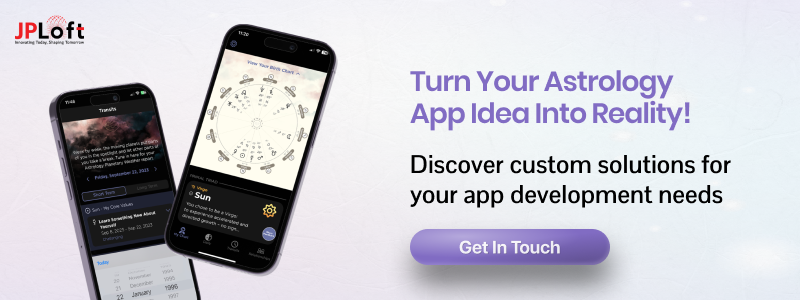
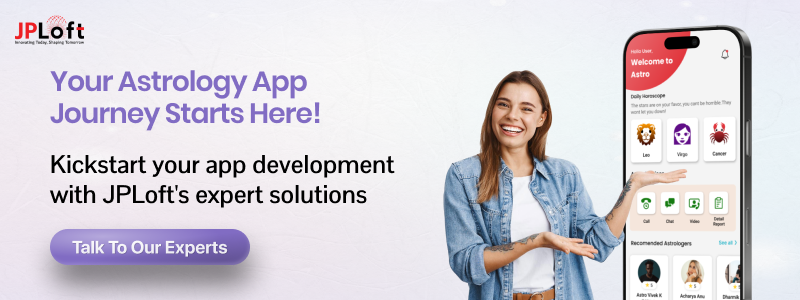
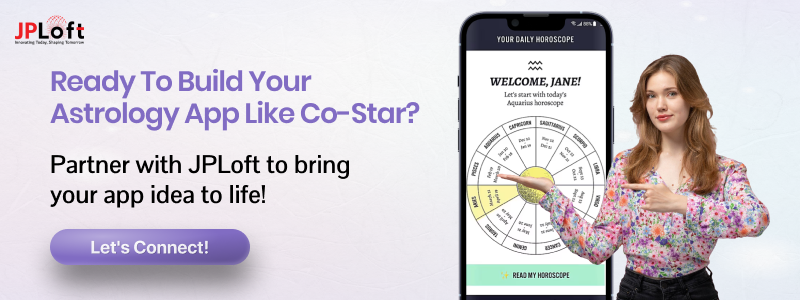

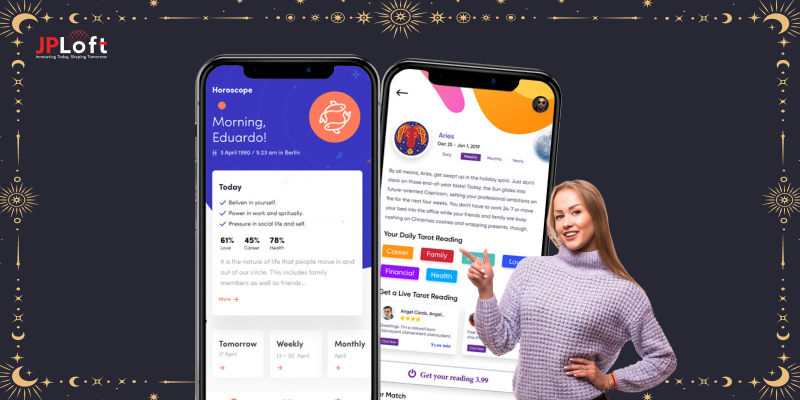
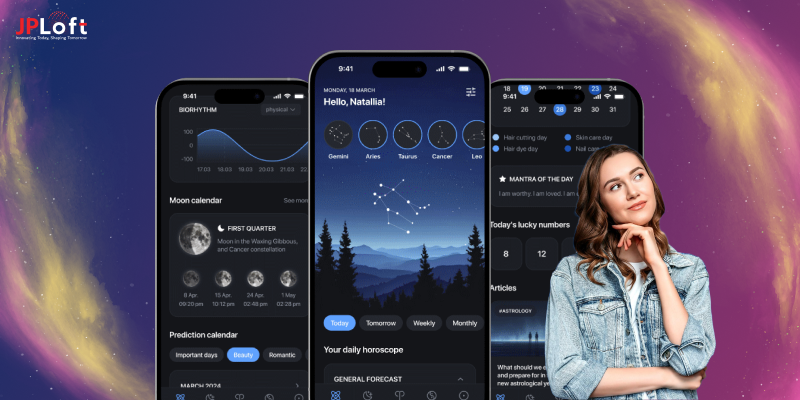
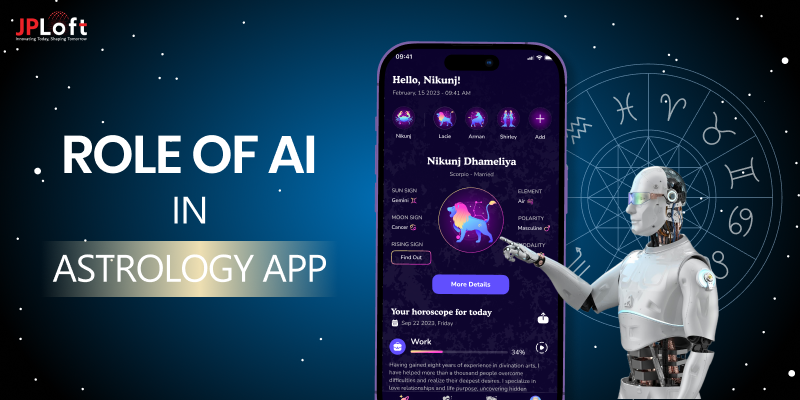



Share this blog